
The Legacy of Jill Whalen: A Trailblazer in SEO
The recent passing of Jill Whalen at the age of 63 leaves a significant mark on the SEO landscape. Known for her unwavering advocacy for content quality and white hat practices, Jill was not only one of the first female SEOs but also a foundational pillar in the industry. Her journey from a stay-at-home mom to an internationally recognized speaker is a testament to her trailblazing spirit, paving the way for countless women in a predominantly male field.
Transforming SEO Through Content-Centric Approaches
Jill Whalen’s influence is prominently felt in the SEO community, particularly in her promotion of content-oriented strategies. Before the term “content marketing” became popular, Jill was actively encouraging SEOs to value content quality above all else. This philosophical shift has been integral to the SEO practices we recognize today and highlights her vision for a more credible and respectable industry. Her dedication is immortalized through platforms like the RankWrite Newsletter, which she co-created, setting the stage for future discourse on content and SEO.
A Personal Connection: Stories of Jill’s Impact
Many in the industry remember Jill fondly. As Heather Lloyd-Martin shared, Jill not only hired her but also inspired her through their joint speaking engagements. The narrative of Jill's first public speaking experience, under the daunting pressure of a gong signaling time overruns, serves as an exquisite example of her remarkable transformation and courage. Jill's story was not just one of personal achievement; it was also about uplifting others, creating spaces for new voices, and welcoming women into the SEO domain.
Jill Whalen’s Role in Shaping Future SEOs
Jill’s influence on the next generation of marketers cannot be overstated. Her initiative to organize the High Rankings conference series provided young professionals the opportunity to showcase their talents and ideas, breeding innovation within the industry. With her guidance, many budding SEOs found their paths and established their own brands, collectively contributing to a more diverse and robust community.
Embracing Change: Jill's Transformation After SEO
After her retirement from the SEO industry, Jill Whalen exemplified the essence of reinvention. Choosing to step away from the SEO spotlight at the peak of her career, she embraced new passions that further enriched her life. Her blog, "What Did You Do With Jill," became a platform for sharing her insights, life experiences, and personal growth, showing that her legacy transcended SEO alone.
What Can We Learn From Jill’s Life and Legacy?
For small business owners and marketers, Jill Whalen's legacy serves as a powerful reminder of the importance of authenticity and excellence in marketing. It emphasizes that behind every SEO strategy lies the need for genuine connection and high-quality content. Small players in the industry should take inspiration from Jill's steadfast commitment to integrity in SEO practices, advocating for a future where quality reigns over quantity and honesty prevails.
Conclusion: Honoring Jill Whalen’s Contributions
As we reflect on Jill Whalen's life, we encourage everyone in the digital marketing space to adopt the lessons she imparted. From championing content quality to supporting women in tech, her legacy is ours to uphold. Let us continue to nurture an environment where ethical SEO practices flourish, inspired by Jill’s exceptional journey and unwavering spirit. In her honor, consider implementing strategies that pivot on quality and authenticity.
 Add Row
Add Row  Add
Add 




Write A Comment